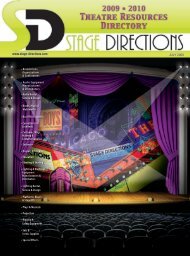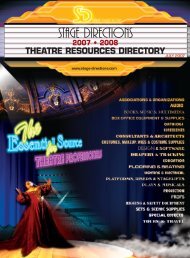May Issue - Stage Directions Magazine
May Issue - Stage Directions Magazine
May Issue - Stage Directions Magazine
Create successful ePaper yourself
Turn your PDF publications into a flip-book with our unique Google optimized e-Paper software.
Special Musical Theatre Section<br />
A P e r f e c t H a r m o n y<br />
Should you hire a musical<br />
director for your school<br />
or community theatre<br />
production? Here are the<br />
pros and cons.<br />
By Lisa Mulcahy<br />
Courtesy of Turtle Lane Playhouse<br />
The job of being a musical director can<br />
make juggling knives seem downright<br />
easy, even in the best theatrical circumstances.<br />
Throw in the additional challenges<br />
that helming an educational or community<br />
production bring, and you really have your<br />
work cut out for you. Think about it: not only<br />
do you have to stage the piece effectively<br />
and make sure that show’s score sounds good, but you’re<br />
dealing with a talent pool that may be inexperienced.<br />
Some directors up the ante even further by trying to act<br />
as their own musical directors as well. Is this savvy — or<br />
suicidal?<br />
It depends on the director, the show and the institution<br />
you’re working with. Some theatres see hiring an<br />
outside musical director as an unnecessary expense, and<br />
really push for a show’s director to pull double duty. On<br />
the other hand, many theatres are averse to any potential<br />
creative risk, so they urge their director to work with a<br />
music specialist to ensure a show’s success. The question<br />
remains: what’s right for your show?<br />
Know Your Needs<br />
Your first step in determining whether to hire a musical<br />
director or let your director take care of the job is to<br />
objectively evaluate the specifics of your production. The<br />
first key factor to consider: the nature of the material itself.<br />
How musically heavy is the piece? If you’re dealing with a<br />
script that contains five songs or fewer, and those songs<br />
are relatively uncomplicated compositions, allowing your<br />
director to teach them to the cast can possibly work<br />
— if your director is musically skilled and experienced.<br />
However, should your show be musically complex, filled<br />
with many vocal parts or with a rangy, sophisticated score,<br />
it’s a far better bet to leave the musical direction squarely<br />
in the hands of a pro who can focus their talents solely on<br />
the job.<br />
If you do end up leaning toward handing the director<br />
the musical reins, your next task is to carefully analyze<br />
whether they can realistically handle both jobs. Your<br />
director’s first commitment must be to guiding the show<br />
as a whole: blocking, character development and technical<br />
supervision will consume a ton of their energy and<br />
The cast of Big River at the Turtle Lane Playhouse, directed by Elaina Vrattos<br />
time. Is your director not only musically adept, but highly<br />
organized and great at multitasking? How much prep<br />
time can they really afford to devote to the music? How<br />
will rehearsal time be effectively structured so that all<br />
aspects of the production get the attention they deserve?<br />
If your director honestly tells you they<br />
are uncomfortable trying to bite off<br />
so much, respect that decision and<br />
resolve to go with a separate musical<br />
director.<br />
Many directors balk at the idea of<br />
adding music to their job description.<br />
“There are many reasons why you<br />
should never be your own musical<br />
director,” warns Michael McGarty, artistic<br />
director of the Harvard Community Theatre in Harvard,<br />
Mass. and director of Harvard’s Broomfield School Drama<br />
Society. “It can only work if the director is somewhat<br />
superhuman, and frankly, not many of us are. Most<br />
directors who function as their own<br />
musical directors run music programs<br />
in schools. They have great musical<br />
skills, but usually poor acting/directing<br />
experience. They function by hiring<br />
a pianist for rehearsals, and think<br />
that they can then do it all.”<br />
“I personally think it’s a bad start<br />
when roles get doubled,” agrees<br />
Elaina Vrattos, a stage director who<br />
Michael McGarty<br />
Elaina Vrattos<br />
has directed musicals throughout New England. “In my<br />
opinion, you are setting yourself up for disaster. It is tough<br />
enough having a director and musical director putting the<br />
piece together. But having one person doing it all? Ugh!”<br />
Some companies actually elect to hire a musical director<br />
to handle the entire show, which is definitely not<br />
courtesy of Michael McGarty<br />
courtesy of Elaina Vrattos<br />
36 <strong>May</strong> 2007 • www.stage-directions.com

















